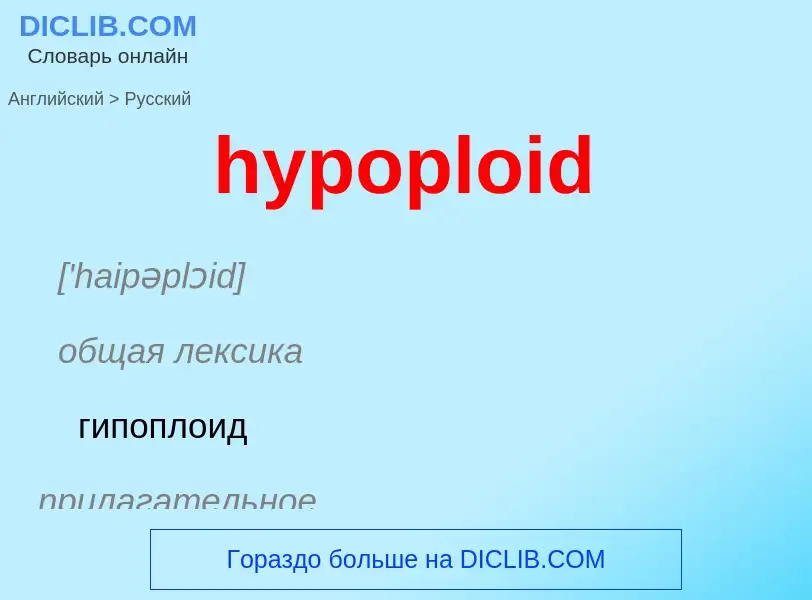Translation and analysis of words by ChatGPT artificial intelligence
On this page you can get a detailed analysis of a word or phrase, produced by the best artificial intelligence technology to date:
- how the word is used
- frequency of use
- it is used more often in oral or written speech
- word translation options
- usage examples (several phrases with translation)
- etymology
hypoploid - translation to russian
['haipəplɔid]
общая лексика
гипоплоид
прилагательное
биология
гипоплоидный
существительное
['haipəplɔid]
биология
гипоплоид
[dai'səumik]
общая лексика
дисомик (диплоидный организм, имеющий по две гомологичные хромосомы каждой пары)
дисомный
прилагательное
биология
дисомный
общая лексика
анэуплоид
анэуплоидный организм
анэуплоидный
медицина
анеуплоидный
Definition
Wikipedia

Aneuploidy is the presence of an abnormal number of chromosomes in a cell, for example a human cell having 45 or 47 chromosomes instead of the usual 46. It does not include a difference of one or more complete sets of chromosomes. A cell with any number of complete chromosome sets is called a euploid cell.
An extra or missing chromosome is a common cause of some genetic disorders. Some cancer cells also have abnormal numbers of chromosomes. About 68% of human solid tumors are aneuploid. Aneuploidy originates during cell division when the chromosomes do not separate properly between the two cells (nondisjunction). Most cases of aneuploidy in the autosomes result in miscarriage, and the most common extra autosomal chromosomes among live births are 21, 18 and 13. Chromosome abnormalities are detected in 1 of 160 live human births. Autosomal aneuploidy is more dangerous than sex chromosome aneuploidy, as autosomal aneuploidy is almost always lethal to embryos that cease developing because of it.



![[[Karyogram]] from a normal male human [[Karyogram]] from a normal male human](https://commons.wikimedia.org/wiki/Special:FilePath/Human male karyotype.gif?width=200)
![Example of [[Trisomy 21]] detected via [[quantitative PCR]] [[short tandem repeat]] assay Example of [[Trisomy 21]] detected via [[quantitative PCR]] [[short tandem repeat]] assay](https://commons.wikimedia.org/wiki/Special:FilePath/Trisomy Detection in GeneMarker.jpg?width=200)
